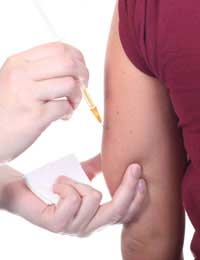DNA Vaccines

Most people in developed nations are not only familiar with the concept of vaccines but have probably received a vaccination at some point in their life. Vaccines help to protect us from serious diseases as well as work to reduce their spread. DNA vaccines are a type of vaccine that helps to protect humans from disease in similar ways to other vaccines. These vaccines do, however, hold some valuable advantages over traditional vaccines. To administer the vaccine, DNA that has been genetically modified is injected into a person to create an immune response. While still largely experimental, they hold promise for safeguarding humans from disease and the many devastating effects that occur as a consequence. This type of vaccine has been researched in relation to viruses, bacteria and parasites that cause disease.
Why Use DNA Vaccines?
There are numerous advantages of DNA vaccines over other vaccination methods. DNA vaccines are thought to trigger a broader range of immune responses, which means they would have more applications than traditional vaccines. Since traditional vaccines only cover certain diseases, the use of DNA vaccines to target a larger number of diseases could impact virtually everyone, given how easy it is to come into contact with one of the many diseases that exist.Comparison of DNA Vaccines and Other Vaccines
To understand DNA vaccines it helps to have a sense of the differences between DNA vaccines and other vaccines used to protect from disease. First generation vaccines are those involving the entire organism, which may be live, 'damaged' or dead. Those vaccines that are live and attenuated trigger an antibody immune response as well as those entailing killer and helper T-cells. Still, there is a low chance that attenuated vaccines can still change to the toxic form, which means that in people with already weakened immune systems the vaccine could cause disease. Although vaccines that are killed do not have the same risk, they are not as effective in addressing a wide range of diseases.Second generation vaccines were developed to address some of the concerns held regarding first generation vaccines. Second generation vaccines are subunit ones that are made up of mostly protein parts such as protein antigens or recombinant proteins although they do not trigger a killer T-cell response.
DNA vaccines constitute a third generation vaccine. These are comprised of a round, relatively small bit of bacterial DNA that has been modified to release one or more particular proteins - also known as antigens - from a microbe. After injection of the DNA vaccine, the recipient's cells translate the DNA into toxic proteins that are viewed as foreign invaders, which serves to begin an immune response.
Benefits of DNA Vaccines
DNA vaccines have many benefits in comparison with the more traditional types of vaccines. For instance, DNA vaccines are thought to provide a better immune response in patients with HIV. Patients with HIV suffer from poor immunity and increased susceptibility to disease. Since DNA vaccines afford the potential for treating chronic viral infections, they could be particularly beneficial for individuals with diseases such as HIV. DNA vaccines are considered cheaper to produce than traditional vaccines and thus provide an affordable way to provide large-scale vaccinations. Since DNA vaccines are also more stable with regards to temperature, they are easier to store and transport.Limitations of DNA Vaccines
Thus far, the limitations of DNA vaccines mostly involve a lack of research, which will likely be remedied in the future when they become a more important area of interest. At present, there is a limitation in regards to microbial activity. While DNA is successful for providing an immune response when the target involves disease-causing proteins, there are some microbes that have an outer shell made of polysaccharides. Unfortunately, DNA vaccines are unsuccessful and instead, subunit vaccines that have a polysaccharide foundation are required.Vaccines remain one of the most important developments of the twentieth century and they are responsible for saving millions of lives and even eliminating disease in some areas. Vaccines allow us to keep disease in controlled numbers and prevent the complications that arise when someone is afflicted with a disease.


Re: How was DNA Discovered?
DNA is not a real thing, the earth is flat, the sun is blue
Re: An Overview of DNA Functions
I tried to extract DNA from my refrigerator, now I have no refrigerator and my food is rotting.
Re: The Properties of DNA
what are 5 characteristics of DNA?
Re: How was DNA Discovered?
betty for the last time im trying to sleep bugger of babe
Re: How was DNA Discovered?
It is past you bedtime winnie pleas go to bved now or no france for you go back to easter island looser!!!
Re: How was DNA Discovered?
My bed time is at 9:00 and it is 9.01 in indea at the moment> i am sooooooooo naughty
Re: How was DNA Discovered?
ICE ICE DAVEY
Re: How was DNA Discovered?
This sorkis absalutely propostuous I found out about DNAfirst these loosers lied
Re: How was DNA Discovered?
meow
Re: How was DNA Discovered?
this workis realy interresting i would love to disscus more about this with you